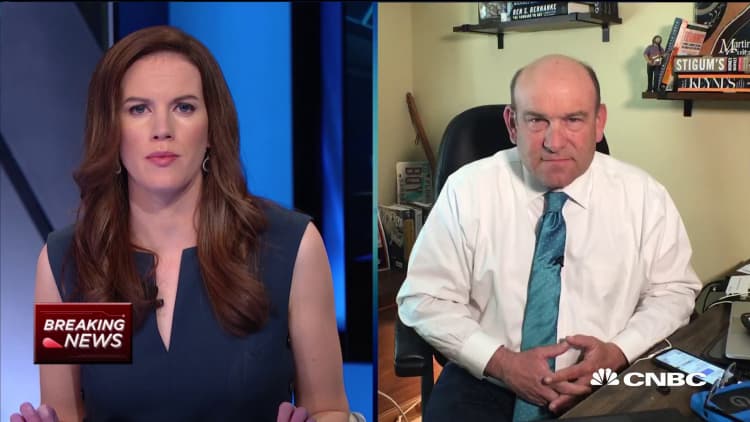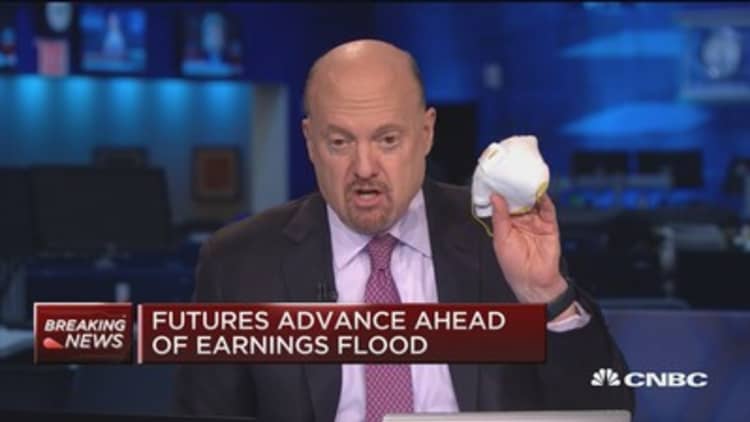The Federal Reserve is about ready to fire up its promised corporate debt-buying program, and the market is starting to get excited.
Following through on an announcement it made nearly a month ago, the central bank said Monday it will start its Secondary Market Corporate Credit Facility "in early May." The Primary Market Credit Facility will begin "soon thereafter."
The announcement sparked a move higher in funds that track high-yield debt and anticipation over how such an unprecedented effort would be carried out.
The two programs allow the Fed to start purchasing corporate debt either directly from companies or though exchange-traded funds that track broad indexes of the bonds.
When the Fed announced the facilities, it came against a backdrop of frozen credit markets where companies that needed operating cash couldn't find buyers. Yields on the debt soared, blowing out the gap between government bonds of similar duration to the widest since the financial crisis.

Since then, the nearly $10 trillion market has settled down, spreads have narrowed and the market picture has brightened. Still, the Fed intends to follow through on its intentions to keep the wheels turning.
"Spreads have come in a lot just based on the Fed's announcement, so they haven't had to buy anything," said Kathy Jones, chief fixed income strategist at Charles Schwab. "They can take their time, they can move very slowly. That being said, there's still going to be a need to use the facilities."
An investing opportunity
Indeed, market demand remains strong. Corporate debt issuance hit record monthly levels in March and April, so a hesitant Fed now could damage a still-fragile ecosystem.
"Bond king" Jeffrey Gundlach at DoubleLine Capital said recently he suspects recent buyers of corporate debt are counting on the Fed's activity in the space and hope to "to sell to the Fed shell company at today's or higher prices in the future."
However, some investors see a more fundamental picture taking shape.
The area of Fed activity getting most of the market's attention is in high-yield, or junk, bonds.
The central bank said it will be including as part of its purchases recently downgraded "fallen angels" that have slipped from investment grade into junk because of ratings agency downgrades that happened because of the coronavirus. These are companies such as Macy's, Occidental Petroleum and the Gap. The Fed likely will purchase such bonds through ETFs.
While there is some danger investing in companies that have suffered during the coronavirus-induced lockdown, the group as a whole provides "equity-like returns with bond-like risk," said Manuel Hayes, senior portfolio manager at Mellon.
"Look at the current landscape we are in today, with lower corporate earnings and a weaker economic outlook," Hayes said. "There are companies that might have been a little reckless during this period and are now being downgraded by ratings agencies. For us, this provides a favorable landscape for the fallen angels investment universe."
Hayes estimated that about $150 billion worth of fallen-angel debt has been downgraded so far in 2020, with the potential for another $500 billion more later this year. Some of the companies on the bubble now and classified as "potential fallen angels" include General Motors, Kraft Heinz and Delta Air Lines, according to Moody's.
He said the prospect for growth represents "a pretty significant opportunity" for an investing group that recovered from the financial crisis in much quicker fashion than the stock market — seven months to recoup losses for high yield compares to 37 months for stocks.
An ETF that tracks fallen angels, the iShares Fallen Angels USD Bond fund, has been on the rise since the Fed's interventions in credit markets. Its biggest components are Continental Resources, Occidental and Telecom Italia.
More moral hazard
Some Fed critics worry about the central bank's movement into buying riskier assets, which step up the central bank's crisis-era interventions into only Treasurys and mortgage-backed securities.
Warren Buffett said Saturday that the Fed's moves could have "extreme consequences," though he noted that inaction also would have had major ramifications.
"I see this program and some of the other Fed facilities as basically expanding its lender of last resort role and extending that benefit beyond the banking sector to now include corporates and municipal governments," said Steven Friedman, senior macroeconomist at MacKay Shields, a 15-year veteran of the New York Fed, which will execute the corporate debt purchases. "What the Fed was trying to do was identify firms that would have remained investment grade were it not for this crisis, and felt it was necessary to support those firms. They did not want those firms to suffer."
Just as during the financial crisis, questions over moral hazard have arisen as the Fed has extended its authority. However, then as now. the necessity for action is trumping debate over longer-term consequences.
"They decided that those moral hazard concerns are less pressing than the imperative of supporting employment in the wake of the crisis," Friedman said. "These are not easy choices here."



